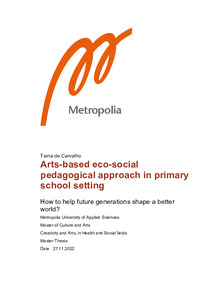Arts-based eco-social pedagogical approach in primary school setting: how to help future generations shape a better world?
de Carvalho, Taina (2022)
de Carvalho, Taina
2022
All rights reserved. This publication is copyrighted. You may download, display and print it for Your own personal use. Commercial use is prohibited.
Julkaisun pysyvä osoite on
https://urn.fi/URN:NBN:fi:amk-2022120426190
https://urn.fi/URN:NBN:fi:amk-2022120426190
Tiivistelmä
This study aims to examine the application of an arts-based eco-social pedagogical approach in the Finnish primary school system in response to the current eco-social crisis, by exploring how it may increase students’ eco-social skills and a sense of connectedness with their environment. The study is based on the educational objectives for environmental education outlined in the Finnish national curriculum and the more general environmental education principles and recommendations established internationally.
Key concepts related to the current eco-social crisis and environmental education are discussed as well as how arts and culture relate to it. The notion of interconnectedness awareness as a supporter of personal and eco-social wellbeing is presented as well as what skills and values must be encouraged in students regarding the current crisis. Finally, the arts-based eco-social pedagogical approach is described.
The data was generated and collected using arts-based eco-social pedagogical approach with a class of 6th-grade students in a primary school in Southern Finland. The group consisted of 23 students, their teacher, and the teacher’s assistant. The process occurred throughout six sessions during the participants' regular school day.
A triangulated phenomenological approach was used for data collection and analysis within the framework of expressive arts therapy. The research identified five key outcomes of the approach that stood out through two complementary lenses: how the approach generates understanding of the subject and how the approach affects participants in relation to the research question. Those are as follows: (1) The process: creating a new culture (2) Wellbeing and safety: a core foundation (3) A sense of meaningfulness (4) An opportunity to engage (5) Fostering creativity and imagination. Finally, a summary of the findings is presented.
Future research may take the form of longitudinal studies to better understand and track participants' potential changes over time, as well as considering the need for a thorough analysis of previous qualitative studies in the field of expressive arts therapy to comprehend the approach's effecting components.
Key concepts related to the current eco-social crisis and environmental education are discussed as well as how arts and culture relate to it. The notion of interconnectedness awareness as a supporter of personal and eco-social wellbeing is presented as well as what skills and values must be encouraged in students regarding the current crisis. Finally, the arts-based eco-social pedagogical approach is described.
The data was generated and collected using arts-based eco-social pedagogical approach with a class of 6th-grade students in a primary school in Southern Finland. The group consisted of 23 students, their teacher, and the teacher’s assistant. The process occurred throughout six sessions during the participants' regular school day.
A triangulated phenomenological approach was used for data collection and analysis within the framework of expressive arts therapy. The research identified five key outcomes of the approach that stood out through two complementary lenses: how the approach generates understanding of the subject and how the approach affects participants in relation to the research question. Those are as follows: (1) The process: creating a new culture (2) Wellbeing and safety: a core foundation (3) A sense of meaningfulness (4) An opportunity to engage (5) Fostering creativity and imagination. Finally, a summary of the findings is presented.
Future research may take the form of longitudinal studies to better understand and track participants' potential changes over time, as well as considering the need for a thorough analysis of previous qualitative studies in the field of expressive arts therapy to comprehend the approach's effecting components.
